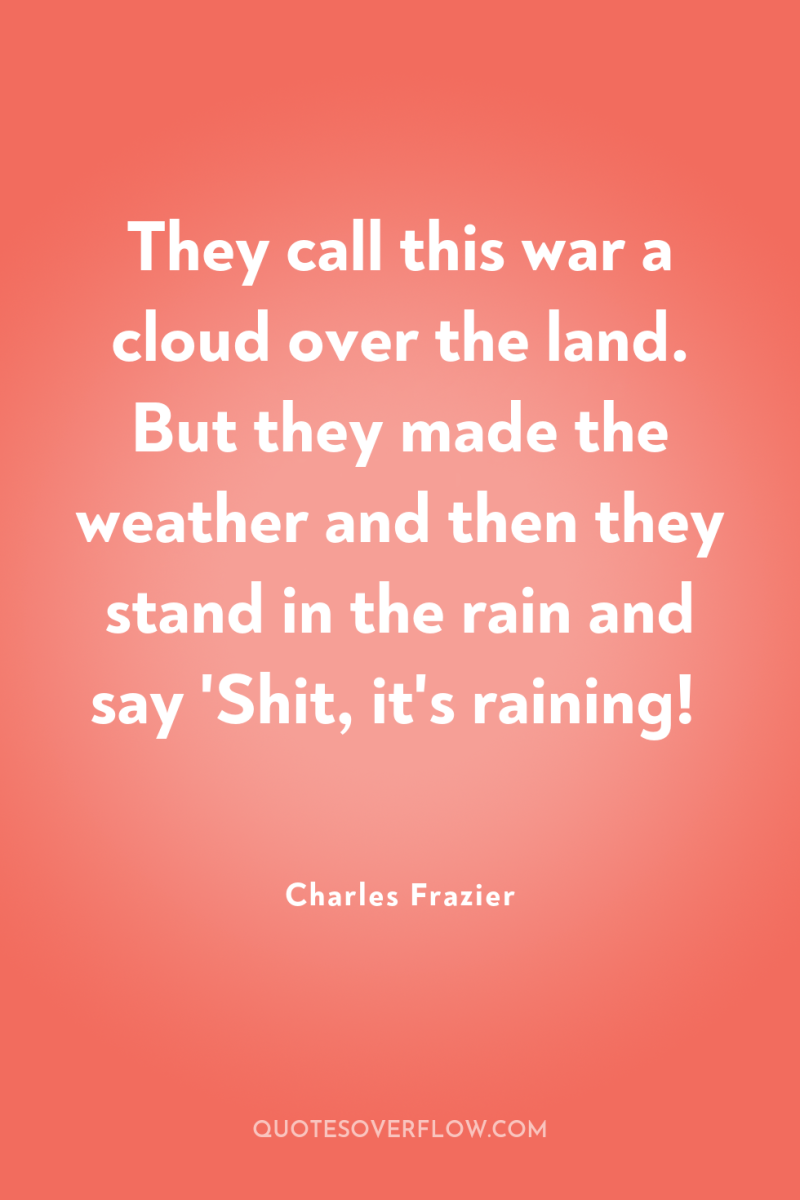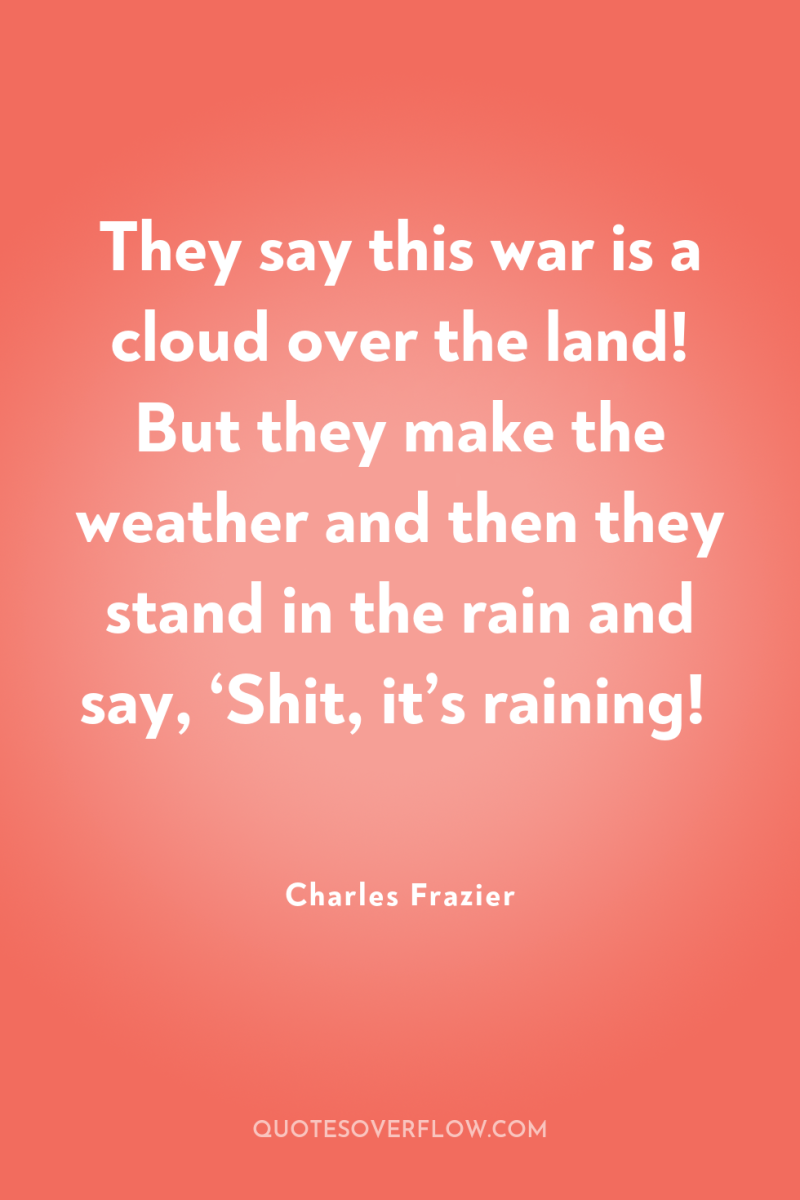1
She fit her head under his chin, and he could feel her weight settle into him. He held her tight and words spilled out of him without prior composition. And this time he made no effort to clamp them off. He told her about the first time he had looked on the back of her neck as she sat in the church pew. Of the feeling that had never let go of him since. He talked to her of the great waste of years between then and now. A long time gone. And it was pointless, he said, to think how those years could have been put to better use, for he could hardly have put them to worse. There was no recovering them now. You could grieve endlessly for the loss of time and the damage done therein. For the dead, and for your own lost self. But what the wisdom of the ages says is that we do well not to grieve on and on. And those old ones knew a thing or two and had some truth to tell, Inman said, for you can grieve your heart out and in the end you are still where you are. All your grief hasn't changed a thing. What you have lost will not be returned to you. It will always be lost. You're left with only your scars to mark the void. All you can choose to do is go on or not. But if you go on, it's knowing you carry your scars with you. Nevertheless, over all those wasted years, he had held in his mind the wish to kiss her on the back of her neck, and now he had done it. There was a redemption of some kind, he believed, in such complete fulfillment of a desire so long deferred.Charles Frazier
2
I'm ruined beyond repair, is what I fear... And if so, in time we'd both be wretched and bitter." "I know people can be mended. Not all, and some more immediately than others. But some can be. I don't see why not you." "Why not me?Charles Frazier
3
His spells portrayed the spirit as a frail thing, contstantly under attack and in need of stength, always threatening to die inside you. Inman found this notion dismal indeed, since he had been taught by sermon and hymn to hold as truth that the soul of man never dies.Charles Frazier
4
How would you ever come to know God’s name for that star? — You wouldn’t, He holds it close, the boy said. It’s a thing you’ll never know. It’s a lesson that sometimes we’re meant to settle for ignorance. Right there’s what mostly comes of knowledge [boy tips his chin at the battlefield]Charles Frazier

5
He said, I've been coming for you on a hard road. I'm never letting you go. Never.Charles Frazier
6
He saw with sorrow that hers was a life he could step right into and keep working at hard from tonight until death. If he allowed himself to ponder it for a minute, he saw all the world hanging over the girl like the deadfall to a trap, ready to drop and crush.Charles Frazier

7
He tried to name which of the deadly seven might apply, and when he failed he decided to append an eighth, regret.Charles Frazier

8
They call this war a cloud over the land. But they made the weather and then they stand in the rain and say 'Shit, it's raining!Charles Frazier

9
They say this war is a cloud over the land! But they make the weather and then they stand in the rain and say, ‘Shit, it’s raining!Charles Frazier

10
It's a good thing war is so terrible or else we'd get to liking it too much.Charles Frazier

11
Inman's only thought looking on the enemy was, "Go home.Charles Frazier
12
She had been struck by the figure of a woman's back in a mirror. She stopped and looked. The dress the figure wore was the color called ashes of roses, and Ada stood, held in place by a sharp stitch of envy or th woman's dress and the fine shape of her back and her thick dark hair and the sense of assurance she seemed to evidence in her very posture. Then Ada took a step forward, and the other woman did too, and Ada realized that it was herself she was admiring, the mirror having caught the reflection of an opposite mirror on the wall behind her. The light of the lamps and the tint of the mirrors had conspired to shift colors, bleaching mauve to rose. She climbed the steps to her room and prepared for bed, but she slept poorly that night, for the music went on until dawn. As she lay awake she thought how odd it had felt to win her own endorsement. .Charles Frazier
13
And she [Ada] thought momentarily that she ought to worry about losing her beauty, about having become brown and stringy and rough. And then she thought that you went on living one day after another, and in time you were somebody else, your previous self only like a close relative, a sister or brother, with whom you shared a past. But a different person, a separate life.Charles Frazier
15
With the snow piling up outside, the warm dry cabin hidden in its fold of the mountain felt like a safe haven indeed, though it had not been such for the people who had lived there. Soldiers had found them and made the cabin trailhead to a path of exile, loss, and death. But for a while that night, it was a place that held within its walls no pain nor even a vague memory collection of pain.Charles Frazier
16
… she claimed it’s a sign of God’s mercy that He won’t let us remember the reddest details of pain. He knows the parts we can’t bear and won’t let our minds render them again. In time, from disuse, they pale away. At least such was her thinking. God lays the unbearable on you and then takes some back.Charles Frazier
17
One thing he discovered with a great deal of astonishment was that music held for him more then just pleasure. There was meat to it. The grouping of sounds, their forms in the air as they rang out and faded, said something comforting to him about the rule of Creation. What the music said was that there is a right way for things to be ordered so that life might not always be just tangle and drift, but have a shape, an aim. It was a powerful argument that life did not just happen.Charles Frazier
18
Ruby said there were many songs that you could not say anybody in particular had made by himself. A song went around from fiddler to fiddler and each one added something and took something away so that in time the song became a different thing from what it had been, barely recognizable in either tune or lyric. But you could not say the song had been improved, for as was true of all human effort, there was never advancement. Everything added meant something lost, and about as often as not the thing lost was preferable to the thing gained, so that over time we'd be lucky if we just broke even. Any thought otherwise was empty pride.Charles Frazier
19
Musicians add to songs and they evolve: For as was true of human effort, there was never advancement. Everything added meant something lost, and about as often as not the thing lost was preferable to the thing gained, so that over time we'd be lucky if we just broke even. Any thought otherwise was empty pride. p. 380Charles Frazier
20
From inside the tavern came the sounds of a fiddle being tuned, various plucks and tentative bowings, then a slow and groping attempt at Aura Lee, interrupted every few notes by unplanned squeaks and howls. Nevertheless the beautiful and familiar tune was impervious to poor performance, and Inman thought how painfully young it sounded, as if the pattern of its notes allowed no room to imagine a future clouded and tangled and diminished.Charles Frazier
21
In his mind, Inman likened the swirling paths of vulture flight to the coffee grounds seeking pattern in his cup. Anyone could be oracle for the random ways things fall against each other. It was simple enough to tell fortunes if a man dedicated himself to the idea that the future will inevitably be worse than the past and that time is a path leading nowhere but a place of deep and persistent threat. The way Inman saw it, if a thing like Fredericksburg was to be used as a marker of current position, then many years hence, at the rate we're going, we'll be eating one another raw. .Charles Frazier
22
He was himself a case in point, and perhaps not a rare one, for his spirit, it seemed, had been burned out of him but he was yet walking.Charles Frazier
23
And it was pointless..to think how those years could have been put to better use, for he could hardly have put them to worse. There was no recovering them now. You could grieve endlessly for the loss of time and for the damage done therein. For the dead, and for your own lost self. But what the wisdom of the ages says is that we do well not to grieve on and on. And those old ones knew a thing or two and had some truth to tell..for you can grieve your heart out and in the end you are still where you were. All your grief hasn't changed a thing. What you have lost will not be returned to you. It will always be lost. You're left with only your scars to mark the void. All you can choose to do is to go on or not. But if you go on, it's knowing you carry your scars with you.Charles Frazier